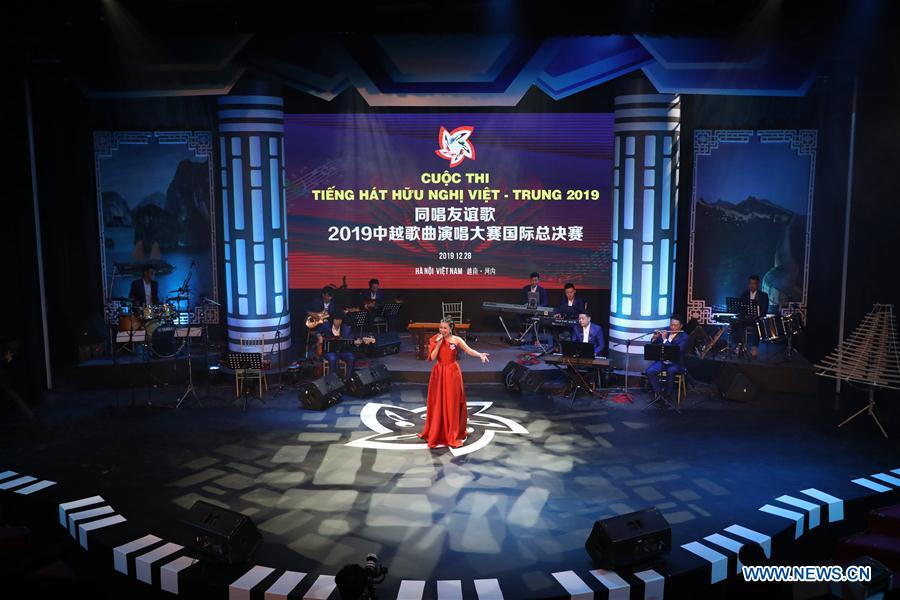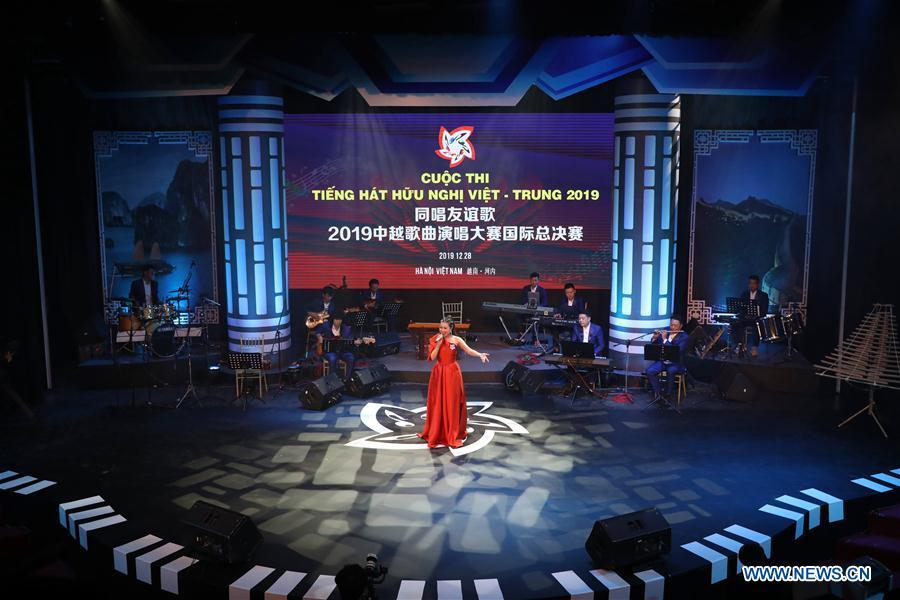
Vietnamese singer Nguyen Thi Ngoc Ha performs during the China-Vietnam Friendship Singing Contest 2019 Final in Hanoi, capital of Vietnam, Dec. 28, 2019. Nguyen Thi Ngoc Ha and Chinese singer Cao Yang won the first prize at the contest together on Saturday. (Xinhua/Wang Di)
HANOI, Dec. 29 (Xinhua) -- "Just like nightingales, we want to bring our songs to all over Vietnam, China and other countries," Nguyen Thi Ngoc Ha, the Vietnamese winner of the China-Vietnam Friendship Singing Contest 2019 Final said here on Saturday night.
Outperforming other contestants from China and Vietnam at the annual singing contest held in Vietnam's captial Hanoi, Ha, a student from the Vocal Music Department under the Hanoi-based Vietnam National Academy of Music, bagged home the first prize together with Chinese singer Cao Yang.
In the final contest, all the singers from both countries need to sing two songs, one in Chinese and the other in Vietnamese.
"Learning to sing in Vietnamese is both challenging and enjoyable. I want to thank my Vietnamese tutors who made great efforts correcting my pronunciation, and hope to have more exchanges and cooperation with Vietnamese singers in the future," Cao told Xinhua after receiving the first prize.
"Traditional friendship between the two countries will be further promoted through activities like this," added Cao, who won applause by singing famous Vietnamese song Dau Mua (Traces of Rain).
His feelings were shared by Vietnamese singers like Ha. "This contest is of significance to young people like me. It gives us chances to make friends with young artists from both countries, and to learn singing and performing techniques from each other," Ha in a dark orange evening gown told Xinhua after securing the first prize, blossoming into a shining smile.
The Vietnamese student, who conquered the judges and audiences with her powerful vocals, dramatic stage performances and good Chinese speaking skills, revealed her secrets of singing vibrantly and fluently in Chinese although she specializes in chamber music, not foreign language.
"For years, I have been using a popular Chinese music application to listen to Chinese songs online and sing along. I also use a Chinese video application called TikTok. These applications have helped me a lot in improving my singing techniques and Chinese skills," Ha said, adding that she also invited a Chinese teacher to tutor her for two months before the contest.
"I think music exchange programs will contribute to closer friendship and cooperation between Vietnam and China in fields like culture and art," Ha said, proposing that relevant agencies and institutions offer more music scholarships and organize more related visits in the two countries.
Her wishes were echoed by Vietnamese culture officials and veteran artists.
"This singing contest is a people's diplomacy activity which helps foster the traditional friendship between Vietnam and China, offering opportunities for the two sides to beef up exchanges and cooperation on arts in general and on music in particular," Nguyen Quang Vinh, acting director of the Department of Performing Arts under the Vietnamese Ministry of Culture, Sports and Tourism, told Xinhua after the contest.
Noting that through the annual event, "many young singers, both Vietnamese and Chinese, have reaped successes," Vinh called for artists, students and lecturers of arts to visit countries of each other more often to exchange experience and expertise via seminars and fact-finding tours.
"It is better and more interesting for them to visit art institutions in the two countries, getting to know each other's culture and art more deeply, not just attending contests and then coming home," the official stated.
Hoang Xuan Binh, head of the contest's organizing board and vice director of the Vietnam National Music, Song and Dance Theater, also stated that frequent studies, seminars, visits and performances in Vietnam and China "will help not only preserve traditional culture and arts of the two countries but also catch up with the new age."
Peng Shituan, cultural counselor of the Chinese Embassy in Vietnam, spoke highly of the annual contest, initiated by the Chinese side in 2005 and then held alternatively in China and Vietnam, as well as the bilateral cultural cooperation between the two countries.




 A single purchase
A single purchase









